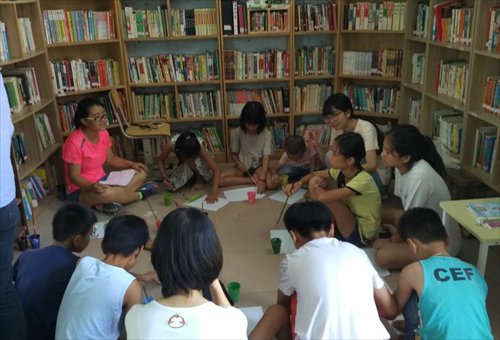HOME >> CHINA
Migrant worker seeks to expand villagers’ minds through reading
By Xu Ming Source:Global Times Published: 2016/7/29 5:03:00

Wu Lizhu Photo: Courtesy of Wu Lizhu
Wu Lizhu is rushed off her feet at the moment as her library "business" is busy, though it is still struggling to survive.Two years ago, when the library had just opened in her hometown, a remote village in Guangdong Province, it seldom saw any visitors. Today the library has become a link between the village and the outside world, and not just through the stories in the books. During the summer holidays, it is filled with college students who provide free classes to the village children.
"More and more children are walking into the library. And it has become a platform for volunteers to help children," said Wu.
Wu's pride in the library is clear. But two years ago, when the 27-year-old first decided to set it up in a place where education is not valued and children start work after middle or even primary school, she faced huge difficulties.
"They didn't understand why I chose to do such a tough but unprofitable thing. I feel lonely even today," said Wu, who went to work in a city at the age of 14, "But I know I needed to change something. I would hate to see the teenagers in the village follow me."
Seeking change

Wu Lizhu's library Photo: Courtesy of Wu Lizhu
"The children in my village usually play along the river or are obsessed with computer games when they are not in class. Now the library has become their favorite hang-out," Wu explained. "The parents don't need to worry about their safety anymore when their children are out of sight, they can just come here to fetch them."But it is not a childcare center. Boasting more than 5,000 books, which were collected nationwide, it is a place where children can feed their imaginations. Wu has also introduced free storytelling and painting classes. Most of the readers in the library are children and teenagers, according to Wu.
Wu got the idea for the library in 2014 after seeing that though more than 10 years had passed since she dropped out of school, things had not changed. Many teenagers were still giving up on their education, something that Wu hopes to change "at the root" through her library.
Wu never finished primary school. This was common in her village, where education, particularly for girls, was scorned. Seeing that the girls came back from the cities dressed well with money in their pockets, Wu joined the migrating army in 2003 at the age of 14.
Wu spent more than 10 years working in different cities, such as Dongguan, Shenzhen and Beijing. She worked in a plastic factory, sold jewelry and clothes and waited tables, earning very little. The hardship she suffered led her to the decision that no one else should follow in her footsteps.
After studying at the "Workers' University" in 2010 which provides education for migrant workers and helps them find direction in life, Wu worked at a primary school for migrant workers' children for several years, and in 2014 decided to go back to her hometown to instigate change.
"The books just serve as the foundation. I hope it can eventually change people's minds," said Wu.
From suspicion to support
Her task was not an easy one. In a village where making money is the priority, a library seemed irrelevant and she faced skepticism. Her own family told her not to bother because the library would just lose money.
"They saw it as unnecessary for a girl to take on such a strenuous task. And they did not see any benefit from the project at all," noted Wu.
The villagers believed that she must be motivated by profit. "They said 'only profit can make one move'," Wu told the Global Times, "They could not believe that I was opening the library just for the benefit of the public." Furthermore, they did not think the library could last since "no one wanted to read."
Fortunately, she got some help from students from a middle school at which she used to teach as a volunteer. They helped clean the library, make rules and spread the word among their friends and relatives.
"At first, the parents did not care for the library at all. Neither did they encourage their children to read there. They just waited and watched," said Wu,
"Three months later, the parents who had said that I was doing this only for profit told me directly that the library was a good thing and should have been opened even earlier," Wu laughed.
Seeing that their children are benefiting from the library, some parents offered to donate books. And Wu once successfully collected money for library's rent in June from the villagers, which gave her a much-needed boost of confidence.
Long way to go
The situation is much better these days. Wu now has three staff members who help her run the library. Her family has become more understanding and some villagers are becoming supportive.
Besides children, adults in the village are also reading in the library. "Mama classes" are frequently held, where illiterate women in the village are taught how to read and write. There are also activities encouraging parents and children to play together.
Through all these activities, Wu hopes to reverse the lack of emphasis on education in the village. "I hope that under-age children will stop going out to work." She also hopes that what she is doing can help children become mentally independent and see other possibilities in life besides the paths set by their parents or family.
Wu said she was very moved recently when a middle school student who helps at the library in his spare time said that "Wu had saved him." The boy said he would have dropped out of school if he had not met Wu.
"As a matter of fact, I am not sure if the library and what I am doing is leading to some good changes to the village. I may notice some, but they are too subtle, and few confide in me like that boy did," Wu said.
Opening the library has left Wu heavily in debt. "I've maxed out all my credit cards," she said. Fortunately, she received nearly 50,000 yuan ($7,510) in financial support from a charitable fund, but the money could only cover one year of expenses. Now she and her team are exploring more sustainable ways to keep the library going.
Wu sometimes feels lonely. She said that in the beginning when she was working alone, the pressure caused by all the criticism led her to question herself sometimes.
"But I immediately gave up these thoughts and became determined again," said Wu.
Newspaper headline: Turning a page
Posted in: Profile